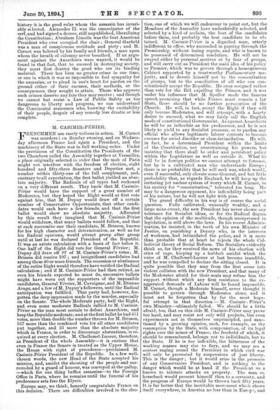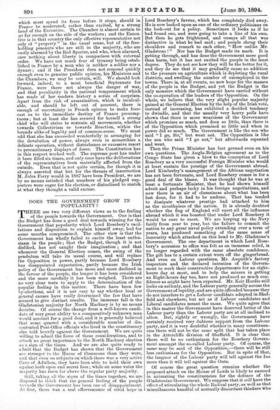M. CASIMIR-PRIER. F RENCHMEN are rarely tedious in action. M. Carnot
was murdere 3 on Sunday evening, and on Wednes- day afternoon France had again a President, and the machinery of the State was in full working order. Under the provisions of the Constitution the Presidents of the two Chambers called the Assembly together at Versailles, a place originally selected in order that the mob of Paris might not interfere with the freedom of election, eight hundred and fifty-three Senators and Deputies met, a number within thirty-one of the full complement, and, contrary to all expectation, the first ballot yielded. an abso- lute majority. The Radicals of all types had reckoned on a very different result. They knew that M. Casimir- Wrier would have the support of a great number of Moderates, but they hoped the Right would at first vote against him, that M. Dupuy would draw off a certain number of Conservative Opportunists, that other candi- dates would each have a few friends, and that the first ballot would show no absolute majority. Affronted by this result they imagined. that M. Casimir-Perier would. withdraw, that many ballots would follow, and that at each successive one their candidate, M. Brisson, known for his high character and determination, as well as for his Radical opinions, would attract group after group until at last he was declared President of the Republic. It was an astute calculation with a basis of fact below it. One half of the Right did vote for General Fevrier ; M. Dupuy did draw off 97 of M. Casimir-Perier's votes ; M. Brisson did receive 197 ; and insignificant candidates had among them 40 or more friends. The secession or abstinence of the entire Right would therefore have verified the Radical calculation ; and if M. Casimir-Perier had then retired, as even his friends expected he must do, successive ballots might have worn out the supporters of the impossible candidates, General Farrier, M. Cavaignac, and M. Etienne Arago, and a few of M. Dupuy's followers, until the Radical anticipation was fulfilled. That party had, however, for- gotten the deep impression made by the murder, especially on the Senate. The whole Moderate party, half the Right, and even some moderate Radicals rallied to M. Casimir- Wrier as the man most certain to defeat Anarchism, and keep the Republic moderate; and at the first ballot he had 451 votes, more than double the number thrown for M. Brisson, 167 more than the combined vote for all other candidates put together, and 23 more than the absolute majority which in France, in order to discourage abstentions, is re- quired at every election. M. Challemel-Lacour, therefore, as President of the whole Assembly—it is curious that even in France the Senate is treated as the Upper House, the House with right of precedence—proclaimed M. Casimir-Perier President of the Republic. In a few well- chosen words, the new Head of the State accepted his mission, and, amidst the shouting of the people and sur- rounded by a guard of honour, was conveyed at the gallop, —which for one thing baffles assassins—to the Foreign Office in Paris, where he remains until the funeral of his predecessor sets free the Elysee. Europe may, we think, honestly congratulate France on this decision. There are difficulties involved in the elec- tion, one of which we will endeavour to point out, but the Members of the Assembly have undoubtedly selected, and selected by a kind of acclaim, the best of the candidates before them, and probably the best candidate to be ob- tained. M. Casimir-P6rier is a dignified man, utterly indifferent to office, who succeeded in passing through the Premiership without losing repute, and who is known to be possessed. of determined resolution. He will not be swayed either by personal motives or by fear of groups, and will carry out as President the main idea of his policy as Premier, which was to govern through a homogeneous Cabinet supported by a trustworthy Parliamentary ma- jority, and to devote himself not to the concentration of groups, but to the conciliation of all who can con- scientiously accept the Republic. He once resigned rather than vote for the Bill expelling the Princes, and it was under his influence that M. Spiffier made the famous speech promising that while France must remain a lay State, there should be no further persecution of the Church. He will, in fact, accept the Right if they will only become Moderates, and will attempt, with a hearty desire to succeed, what we may fairly call the English mode of constitutional Government. As against Anarchists he will be as inflexible •as his predecessor, and. be is not likely to yield to any Socialist pressure, or to pardon any official who allows legitimate labour contests to become excuses for social disorder or class-intimidation. He will, in fact, be a determined President within the limits of the Constitution, not overstraining his powers, but insisting that there shall be order and persistent policy within the Legislature as well as outside it. What he will be in foreign politics we cannot attempt to forecast, but he is a, cultivated man who understands Europe ; there is no probability that he will seek war, which would, even if successful, only elevate some General, and but little probability that, as regards England, he will keep up the irritating yet useless system of worry which M. Carnot, in his anxiety for "concentration," tolerated too long. He may be a dangerous opponent, his inflexibility being part of his nature, but he will not fight with pins. The grand. difficulty in his way is of course the social question. Fully cultivated, unusually wealthy, and a large mine-owner, the new President has never shown any tolerance for Socialist. ideas, or for the Radical dogma that the opinion of the multitude, though unexpressed in legislation, is still above the laws. In his recent Adminis- tration, he insisted, in the teeth of his own Minister of Justice, on punishing a Deputy who, in the interests of workmen, had intimidated the police, and it is more than probable that at heart he rejects the whole Col- lectivist theory of Social Reform. The Socialists evidently think so, for they received the news of his election with cries of rage, keeping up a hubbub amidst which the voice of M. Challemel-Lacour at last became inaudible, and he was compelled to declare the sitting closed. It is quite possible that they may from the first come into violent collision with the new President, and that many of the Moderates afraid for their seats may refuse him the support without which any find resistance to the ex- aggerated demands of Labour will be found impossible. M. Carnot, though a Moderate himself, never thought it possible to govern through Moderates alone, and it must not be forgotten that by far the most hope- ful attempt in that direction — M. Casimir - Nrier's own Ministry—ultimately failed. We should be a little afraid, too, that on this side M. Casimir-Perier may prove too hard, and may resist not only wild projects, but even experiments not in themselves unprincipled, and sanc- tioned by a growing opinion, such, for example, as the resumption by the State, with compensation, of its legal rights over the mines of France, the freehold of which, it should be remembered, belongs not to individuals, but to the State. If he is too inflexible, the bitterness of the working masses may rise to fury, and we may see a contest raging round the President in which civil war will only be prevented by suspensions of just liberty. This is the danger ; but it would arise in the presence of any Conservative President, and is nothing to the danger which would. be at hand if the President we e known to tolerate attacks on property. The man on horseback would present himself then to a certainty, and the progress of Europe would be thrown back fifty years. It is far better that the inevitable movement which shows itself everywhere, in America no less than in Europ', and which must spend its force before it stops, should in France be moderated, rather than excited, by a strong head of the Executive. The Chamber is almost certain to go far enough on the side of the workers ; and the Execu- tive is in that country the only effective representative not only of " property " in the usual sense, but of the free- holding peasants who are still in the majority, who are easily alarmed by the Red Spectre, and who, when alarmed, care nothing about liberty in comparison with external order. We have not much fear of tyranny being estab- lished in France by a man who is neither a soldier nor a dynast ; and if the President does not respond quickly enough even to genuine public opinion, his Ministers and the Chambers, we may be certain, will. We should look forward, indeed, to a most beneficial Septennate for France, were there not always the danger of war, and that peculiarity in the national temperament which has made of her modern history a series of surprises. Apart from the risk of assassination, which is incalcul- able, and should be left out of account, there is enough of uncertainty in French opinion to make fore- cast as to the immediate destiny of France presump- tuous ; but at least she has secured for herself a strong chief who will strive to restrain all movements, whether towards Collectivism or towards Reaction, within the bounds alike of legality and of common-sense. We must add that she has succeeded wonderfully in arranging for the devolution of power, always even in monarchies a delicate operation, without disturbance or excessive resort to precautionary displays of force. The Constitution has in this respect worked well. The supreme post has under it been filled six times, and only once have the deliberations of the representatives been materially affected from the outside. Even that is not quite certain, for though it is always asserted that but for the threats of insurrection M. Jules Ferry would in 1887 have been President, we are by no means satisfied that numbers of his pledged sup- porters were eager for his election, or disinclined to snatch at what they thought a valid excuse.



















































 Previous page
Previous page